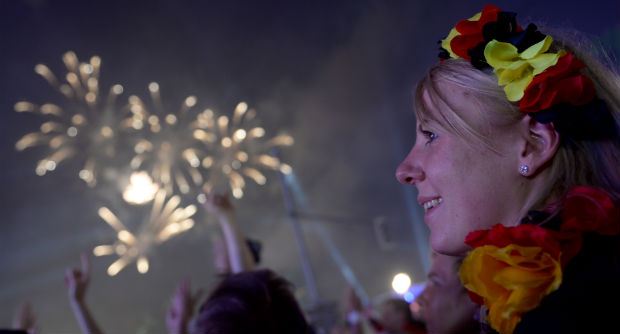
Fireworks illuminate the sky as German fans celebrate their team after Germany won against Argentina by 1-0 at the soccer World Cup final in Rio de Janeiro, Brazil, at a public viewing area called ‘Fan Mile’ in Berlin, early Monday July 14, 2014. AP
BERLIN – Germany erupted in ecstasy Sunday, with fans dancing the night away, after the World Cup final win against Argentina that handed the country its historic fourth title.
Fireworks exploded across Berlin as delirious supporters cheering the 1-0 victory thronged the streets and honking cars snaked their way through crowds, with black, red and gold German flags flapping in the wind.
More than 250,000 fans jumped for joy in the heart of the capital, many singing “Oh, it’s beautiful!” and chanting “Super Deutschland”.
“We’re going to party all night,” said Bianca Hoffmann, 35, who traveled to Berlin from the western state of North Rhine-Westphalia to join in the country’s biggest World Cup gathering.
The city closed the so-called Fan Mile to traffic behind the Brandenburg Gate, the symbol of national unity, to make way for revellers basking in the German side’s glory in its thrilling showdown against Argentina.
“This victory is hugely important – it’s my first!” said Carsten Glaser, 20.
While the Germans were a “team,” he said, “Argentina only had (Lionel) Messi.”
On nearby Potsdamer Platz, cleaved in two by the despised Berlin Wall until its fall a quarter-century ago, one young man jumped on the roof of a public bus as raucous supporters blocked streets for traffic.
And on the chic shopping avenue Kurfuerstendamm in the west of the capital, traditionally a venue for major sports celebrations, fans set off firecrackers and waved giant flags.
Many supporters saw the victory as having a deeper historical resonance, coming a long 24 years after West Germany beat Argentina in 1990, just months before the country overcame its Cold War division.
“This victory is important for reunified Germany,” Thorsten Kinscher, a 34-year-old employee in the shipping industry, said.
“It shows we are really in this together,” behind a team of players from the former west and the ex-communist east, he said.
Crowds surpassed the announced 200,000 maximum capacity on the Fan Mile hours before the match, an event spokeswoman said.
Braving intermittent showers, vendors did a booming business in currywurst, a local specialty of sausage smothered in spicy ketchup, and plastic cups of beer.
Millions more huddled in front of screens at beer gardens, bars, sports clubs and sitting rooms across the country to watch the match from Rio de Janeiro’s legendary Maracana stadium.
Congratulations from space
Normally a rare sight due to the country’s militaristic past, German flags fluttered from street lamps and supporters’ shoulders, worn like superhero capes.
Revellers young and old, male and female donned mohawk wigs, bunny ears and cowboy hats in the national colors, as well as Hawaiian-style garlands of plastic flowers in black-red-gold.
Anett Voelker, 42, said it had been an agonizing 24-year wait for a fourth star for the German jerseys.
“It’s been a super championship for reunited Germany – a feeling of even greater unity,” she said.
At half-time with the match tied at 0-0 after a nerve-jangling series of near-misses for each side, some fans started to lose their swagger.
“The Germans aren’t playing well – Argentina is better,” said 18-year-old Tom Ulmann, tiny German flags painted on his cheeks.
“If it continues like this we’re going to lose.”
Germany had led Brazil 5-0 at the same point in the semi-final match last Tuesday, which they went on to win by a jaw-dropping 7-1.
But a desperately awaited goal in overtime by Mario Goetze revived spirits and the final whistle sealed the celebration.
“I am so surprised and relieved,” said Frank Wegner, a 45-year-old from Brandenburg state outside Berlin.
Alexander Gerst, a German living on the International Space Station, tweeted his congratulations from the heavens.
“As an expert on the issue of stars, we got one,” he wrote above a picture of himself pointing to a fourth star on his Germany jersey.

